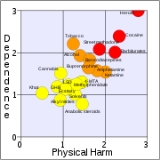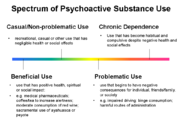
Substance abuse
Encyclopedia
A substance-related disorder is an umbrella term
used to describe several different conditions (such as intoxication, harmful use/abuse, dependence, withdrawal, and psychoses or amnesia associated with the use of the substance) associated with several different substances (such as alcohol
or opiods).
A substance related disorder is a condition in which an individual uses or abuses a substance to the point where it leads to maladaptive behaviours, manifested by at least one symptom that interferes with normal life functioning within a 12 month period. Diagnostic criteria for substance dependence requires at least three of the following during a 12 month period: development of tolerance to the substance, withdrawal symptoms, persistent desire/unsuccessful attempts to stop using the substance, ingestion of larger amounts of substance, declined life functioning, and persistent use of substance. Substance abuse is most prevalent among people 18 to 25 years of age and is also more common in males than females and in urban residents compared to those who live in rural areas. Over 50 percent of individuals with substance abuse issues have another psychiatric disorder, something that is termed Comorbid Psychiatric Diagnosis. Substance abuse can manifest in a variety of ways, differing in terms of the substance abused, the pattern of use and the comorbid illness present. Commonly abused substances include alcohol, stimulants, sedatives/hypnotic drugs, opioids, hallucinogens, "designer drugs", inhalants and marijuana.
Substance-related disorders can be subcategorized into "substance use disorders" (SUD) and "substance-induced disorders" (SID).
Though DSM-IV makes a firm distinction between the two, SIDs often occur in the context of SUDs.
Some people can have strong drug cravings even after they have not used the drug for a long period of time. They call this being "clean". To figure out how the brain triggers these cravings they have done multiple test on mice.
These conditions include intoxication, withdrawal
, substance-induced delirium, substance-induced psychosis
, and substance-induced mood disorders.
 ]
]
Substance use disorders include substance abuse
and substance dependence
. In DSM-IV, the conditions are formally diagnosed as one or the other, but it has been proposed that DSM-V combine the two into a single condition called "Substance-use disorder".
Umbrella term
An umbrella term is a word that provides a superset or grouping of concepts that all fall under a single common category. Umbrella term is also called a hypernym. For example, cryptology is an umbrella term that encompasses cryptography and cryptanalysis, among other fields...
used to describe several different conditions (such as intoxication, harmful use/abuse, dependence, withdrawal, and psychoses or amnesia associated with the use of the substance) associated with several different substances (such as alcohol
Alcohol
In chemistry, an alcohol is an organic compound in which the hydroxy functional group is bound to a carbon atom. In particular, this carbon center should be saturated, having single bonds to three other atoms....
or opiods).
A substance related disorder is a condition in which an individual uses or abuses a substance to the point where it leads to maladaptive behaviours, manifested by at least one symptom that interferes with normal life functioning within a 12 month period. Diagnostic criteria for substance dependence requires at least three of the following during a 12 month period: development of tolerance to the substance, withdrawal symptoms, persistent desire/unsuccessful attempts to stop using the substance, ingestion of larger amounts of substance, declined life functioning, and persistent use of substance. Substance abuse is most prevalent among people 18 to 25 years of age and is also more common in males than females and in urban residents compared to those who live in rural areas. Over 50 percent of individuals with substance abuse issues have another psychiatric disorder, something that is termed Comorbid Psychiatric Diagnosis. Substance abuse can manifest in a variety of ways, differing in terms of the substance abused, the pattern of use and the comorbid illness present. Commonly abused substances include alcohol, stimulants, sedatives/hypnotic drugs, opioids, hallucinogens, "designer drugs", inhalants and marijuana.
Substance-related disorders can be subcategorized into "substance use disorders" (SUD) and "substance-induced disorders" (SID).
Though DSM-IV makes a firm distinction between the two, SIDs often occur in the context of SUDs.
Some people can have strong drug cravings even after they have not used the drug for a long period of time. They call this being "clean". To figure out how the brain triggers these cravings they have done multiple test on mice.
Substance-induced disorders
Substance-induced disorders include medical conditions that can be directly attributed to the use of a substance.These conditions include intoxication, withdrawal
Withdrawal
Withdrawal can refer to any sort of separation, but is most commonly used to describe the group of symptoms that occurs upon the abrupt discontinuation/separation or a decrease in dosage of the intake of medications, recreational drugs, and alcohol...
, substance-induced delirium, substance-induced psychosis
Substance-induced psychosis
Substance-induced psychosis is a form of substance-related disorder where psychosis can be attributed to substance use.Various psychoactive substances have been implicated in causing, exacerbating, and/or precipitating psychotic states and/or disorders in users...
, and substance-induced mood disorders.
Substance use disorders

Substance use disorders include substance abuse
Substance abuse
A substance-related disorder is an umbrella term used to describe several different conditions associated with several different substances .A substance related disorder is a condition in which an individual uses or abuses a...
and substance dependence
Substance dependence
The section about substance dependence in the Diagnostic and Statistical Manual of Mental Disorders does not use the word addiction at all. It explains:...
. In DSM-IV, the conditions are formally diagnosed as one or the other, but it has been proposed that DSM-V combine the two into a single condition called "Substance-use disorder".
See also
- Behavioural sciencesBehavioural sciencesThe term behavioural sciences encompasses all the disciplines that explore the activities of and interactions among organisms in the natural world. It involves the systematic analysis and investigation of human and animal behaviour through controlled and naturalistic observation, and disciplined...
- Substance abuse preventionSubstance Abuse PreventionSubstance abuse prevention, also known as drug abuse prevention, is a process that attempts to prevent the onset of substance use or limit the development of problems associated with using psychoactive substances. Prevention efforts may focus on the individual or their surroundings...
- Substance-abuse rehabilitation
- Substance abuse treatment
- Shared careShared CareShared care involves the establishment of partnerships between professionals and laymen where they share a common goal. For example: the improvement in the health of a patient where there is patient empowerment to take a major degree of responsibility for his or her care, or an arrangement where...
- Chemical dependency
- AddictionSubstance use disorderSubstance use disorders include substance abuse and substance dependence. In DSM-IV, the conditions are formally diagnosed as one or the other, but it has been proposed that DSM-5 combine the two into a single condition called "Substance-use disorder"....
- Major depressive disorder
- AnxietyAnxietyAnxiety is a psychological and physiological state characterized by somatic, emotional, cognitive, and behavioral components. The root meaning of the word anxiety is 'to vex or trouble'; in either presence or absence of psychological stress, anxiety can create feelings of fear, worry, uneasiness,...
- Psychological traumaPsychological traumaPsychological trauma is a type of damage to the psyche that occurs as a result of a traumatic event...
- Self-medicationSelf-medicationSelf-medication is a term used to describe the use of drugs or other self-soothing forms of behavior to treat untreated and often undiagnosed mental distress, stress and anxiety, including mental illnesses and/or psychological trauma...

